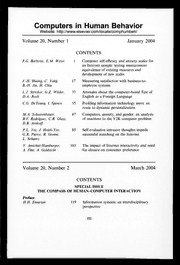
Computers in Human Behavior 2004: Vol 20 Table of Contents PDF
Preview Computers in Human Behavior 2004: Vol 20 Table of Contents
Computers in Human Behavior Website: http://www.elsevier.com/locate/comphumbeh/ Volume 20, Number 1 January 2004 CONTENTS F.G. Barbette, E.M. Weiss Computer self-efficacy and anxiety scales for an Internet sample: testing measurement equivalence of existing measures and development of new scales J.-H. Huang, C. Yang, Measuring satisfaction with business-to- B.-H. Jin, H. Chiu employee systems L.J. Stricker, G.Z. Wilder, Attitudes about the computer-based Test of D.A. Rock English as a Foreign Language C.G. De Young, I. Spence Profiling information technology users: en route to dynamic personalization M.A. Schottenbauer, Computers, anxiety, and gender: an analysis B.F. Rodriguez, C.R. Glass, of reactions to the Y2K computer problem D.B. Arnkoff P.L. Yee, J. Hsieh- Yee, Self-evaluative intrusive thoughts impede G.R. Pierce, R. Grome, successful searching on the Internet L. Schantz Y. Amichai-Hamburger, The impact of Internet interactivity and need A. Fine, A. Goldstein for closure on consumer preference Volume 20, Number 2 March 2004 CONTENTS SPECIAL ISSUE THE COMPASS OF HUMAN-COMPUTER INTERACTION Preface H.H. Emurian 119 Information systems: an interdisciplinary perspective II] P. Zhang, N. Li An assessment of human-computer interaction research in management information systems: topics and methods A.A. Ozak, G. Salvendy Twenty guidelines for the design of Web-based interfaces with consistent language A. Komlodi Task management support in information seeking: a case for search histories W.G. Lutters Identifying expertise markers in routine work artifacts: exploring micronote taking behavior J. Preece, B. Nonnecke, The top five reasons for lurking: improving D. Andrews community experiences for everyone H.M. Cuevas, S.M. Fiore, Fostering constructive cognitive and C.A. Bowers, E. Salas metacognitive activity in computer-based complex task training environments R. Colonia- Willner Self-service systems: new methodology reveals customer real-time actions during merger J. Lazar, Improving web accessibility: a study of A. Dudley-Sponaugle, webmaster perceptions K.-D. Greenidge J.D. Campbell Interaction in collaborative computer supported diagram development J.V. Brady, R.D. Hienz, Distributed interactive communication in S.R. Hursh, L.C. Ragusa, simulated space-dwelling groups C.O. Rouse, E.D. Gasior Commentary D.A. Boehm-Davis Revisiting information systems as an interdisciplinary science May 2004 Volume 20, Number 3 CONTENTS P.C. Cooley, L. Ganapathi, 345 Implementing multilingual touch-screen S. Li audio-CASI applications IV Examining the performance and attitudes of sixth graders during their use of a problem- based hypermedia learning environment L. Zhou, J.K. Burgoon, 381 Language dominance in interpersonal decep- D. Zhang, J.F. Nunamaker tion in computer-mediated communication Y.X. Skadberg, J.R. Kimmel 403 _ Visitors’ flow experience while browsing a Website: its measurement, contributing factors and consequences H.H. Emurian A programmed instruction tutoring system for Java™: consideration of learning performance and software self-efficacy Volume 20, Number 4 July 2004 CONTENTS W.G. Sharp, D.S. Hargrove 461 Emotional expression and modality: an analysis of affective arousal and linguistic output in a computer vs. paper paradigm S.E. Schulenberg, Ethical issues in the use of computerized B.A. Yutrzenka assessment D.-Y.M. Lin. Evaluating older adults’ retention in hypertext perusal: impacts of presentation media as a function of text topology F. Calisir, F. Calisir The relation of interface usability character- istics, perceived usefulness, and perceived ease of use to end-use satisfaction with enterprise resource planning (ERP) systems M. Workman Performance and perceived effectiveness in computer-based and computer-aided educa- tion: do cognitive styles make a difference? P.D. Elgin, M.M. Clapham Attributes associated with the submission of electronic versus paper résumés G. van den Boom, F. Paas, Reflection prompts and tutor feedback in a J.J.G. van Merriénboer, web-based learning environment: effects on T. van Gog students’ self-regulated learning competence V J.G. Cremades, A. Barreto, 569 Human-computer interfaces with regional D. Sanchez, M. Adjouadi lower and upper alpha frequencies as on-line indexes of mental activity Volume 20, Number September 2004 CONTENTS J. Todman, E. Drysdale 581 Effects of qualitative differences in initial and subsequent computer experience on computer anxiety R.P. Lanthier, Internet use and college adjustment: the R.C. Windham moderating role of gender K. Kreijns, P.A. Kirschner, Measuring perceived quality of social space in W. Jochems, H. van Buuren distributed learning groups C.E. Lewis, L.F. Thompson, The impact of recipient list size and priority K.L. Wuensch, signs on electronic helping behavior W.F. Grossnickle, J.G. Cope J.F. Carlson, V.S. Harvey Using computer-related technology for assessment activities: ethical and professional practice issues for school psychologists T.M. Shaft, M.P. Sharfman, Reliability assessment of the attitude towards W.W. Wu computers instrument (ATCI) M. Prezza, M.G. Pacilli, Loneliness and new technologies in a group of S. Dinelli Roman adolescents Volume 20, Number 6 November 2004 CONTENTS T. Amiel, S.L. Sargent 711 Individual differences in Internet usage motives C. Piotrowski, 727 Is Web-based instruction popular in S.J. Vodanovich psychology? A national survey VI S.C. Yang, S.F. Liu 733 Case study of online workshop for the professional development of teachers M. Vuorela, L. Nummenmaa 763 How undergraduate students meet a new learning environment? E.-J. Lee 779 Effects of gendered character representation on person perception and informational social influence in computer-mediated communication M. Kuttschreuter, Time will tell: changes in risk perception and J.M. Gutteling the processing of risk information about the Y2K-risk K.J. Garland, J.M. Noyes Computer experience: a poor predictor of computer attitudes Volume Contents and Author Index
